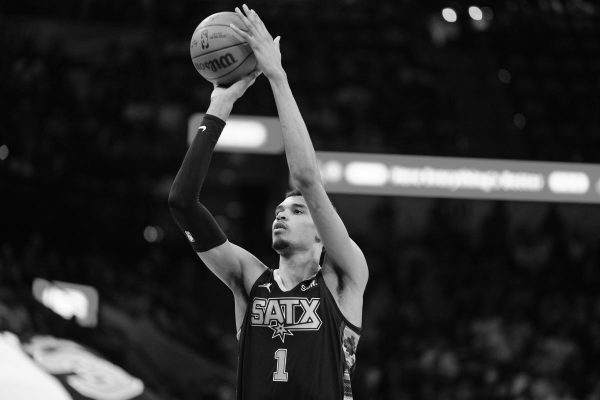NBA MVP Vote Must Return to Players, Away from Press
Just over two weeks into the NBA season, the Golden State Warriors and Cleveland Cavaliers are already sure to face off in a championship rematch — their fourth straight Finals duel — and once again take all of the suspense out of the league. The 82-game season may not be exciting, but the MVP race has historically added drama to the regular season. Last year was one of the tightest MVP races in history. Russell Westbrook, James Harden, LeBron James, and Kawhi Leonard all had MVP-worthy seasons, and Westbrook ultimately came away with the award after becoming the second player ever to average a triple-double over the course of a season. This year, the race is shaping up to be just as good, with the usual suspects — like James — already dominating out of the gate, and new faces like Giannis Antetokounmpo emerging as potential legends in the league. However, in a league absolutely teeming with talent, it’s time for the NBA to let the players, not sports writers, vote on the award again.
From 1955 to 1980, the NBA MVP was determined by a player vote, with the only caveat being that players could not vote for themselves or other players on their team. Then for the 1980–1981 season, voting rights switched to sports writers and broadcasters, with an additional fan ballot introduced later in 2010. The voting system shifted after Kareem-Abdul Jabbar won the MVP a record six times in only 10 years — the suspicion that players would blackball competitors or organize to make sure certain players did not win also led to Wes Unseld’s controversial MVP award in 1969 during his rookie season. Unfortunately, the move also gave the power of determining MVP to people who either are not currently playing or have never played in the NBA. Rather, they’re more concerned with NBA storylines than who is playing the best basketball.
While sports writers first overhauled the voting system to ensure the most deserving players won the award, this has not been effective. If anything, sports writers have suffered from “voter fatigue,” or refusing to give deserving MVPs to those who have already won recently, leading to questionable MVP decisions. While this may make their jobs more exciting, it degrades the value of the award. Most notably, this happened in the 1996–1997 season, when Karl Malone won the MVP over Michael Jordan despite Jordan having virtually the same, if not better, season than the previous year in which he did win MVP.
Players’ picks and writers’ votes are not always the same. Each summer since 2011, after the season has ended, the NFL has its players rank their peers and release the results. In the last three years, the reigning MVP has only been voted the number-one overall player once, and this past offseason, Matt Ryan, the reigning MVP, was ranked number 10. While most awards are determined by the press, including the NFL and the Heisman, it makes the most sense for the NBA to make the switch back to players.
Today, the NBA is an incredibly exclusive brotherhood — often times referred to as a fraternity — of men who have been playing with each other since as early as middle school, as AAU, a youth basketball league, has made it easier for the best talent to compete against one another. While sports outlets such as ESPN and Bleacher Report may focus on supposed player rivalries such as Kevin Durant and Russell Westbrook, in reality, the players are on much better terms than in the ’80s or ’90s when players would openly feud, like Michael Jordan and Isaiah Thomas. For the 1992 Olympics, the first time professional athletes were allowed to compete in the games, Michael Jordan said that he would not participate unless Isaiah Thomas, one of the best point guards in the world, was left off the team. Of course, Jordan went on to play on arguably the greatest basketball team ever assembled, and Thomas was left out of history. Today, NBA players are so connected to one another that they actually end up recruiting each other without the help of their front offices. LeBron James has been openly courted by the Los Angeles Lakers for over a year now, as players there know that he lives only a few blocks from the Staples Center in Los Angeles, and James Harden had more to do with the Houston Rockets’ acquisition of Chris Paul this summer than his general manager Daryl Morey.
The MVP should not go to the best story, or the brightest star, but the most valuable player, and that is why it is the players themselves who should determine who that is. Sporting news follows NBA storylines and personalities as much as — if not more than — they measure the skill of players. NBA players’ jobs are to compete every night, and play basketball at the highest level in the world, and each year there is always an elite pantheon of players who rise above the rest. While each has their own distinct game, their personalities distinguish them most, which has been the hallmark of the NBA since the Magic and Bird era of the ’80s. The baggy shorts and wagging tongue of Air Jordan and the jaw-dropping dominance of King James have helped make the NBA must-watch television for years. This year, in the greatest rookie class since James, Dwyane Wade, and Carmelo Anthony in 2004, sports writers have flocked to the headline-grabbing Ball family, but Lonzo Ball’s 10.4 points, 7.3 rebounds, and 7.0 assists on 33 percent shooting per game pale in comparison to Ben Simmons’ 18.5 points 9.6 rebounds and 7.9 assists on 55 percent. Sports writers are paid to tell sports stories, and are paid especially well when these stories are exciting, but by giving them the NBA vote, they put the strength of their stories over the actual game being played.



